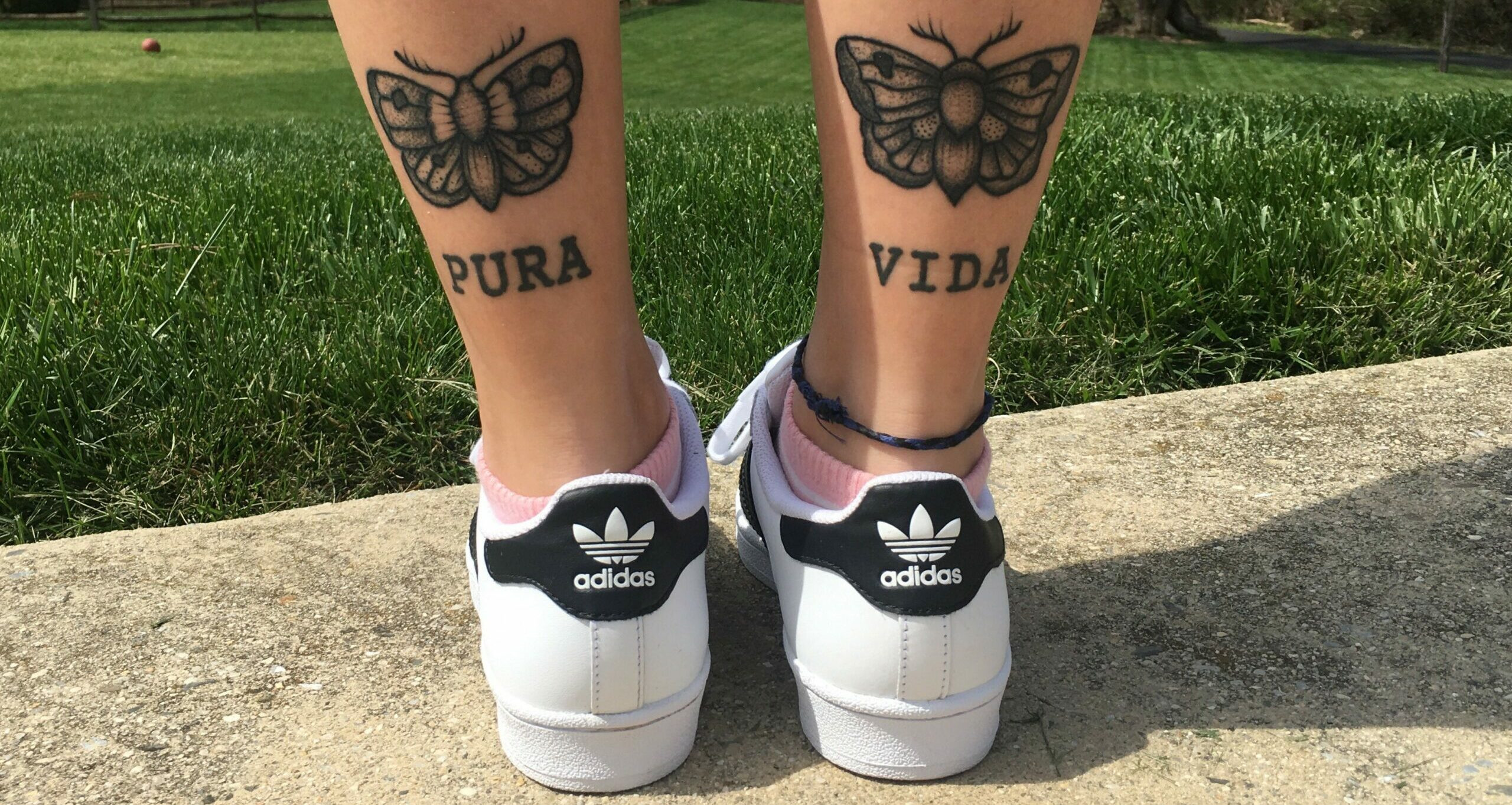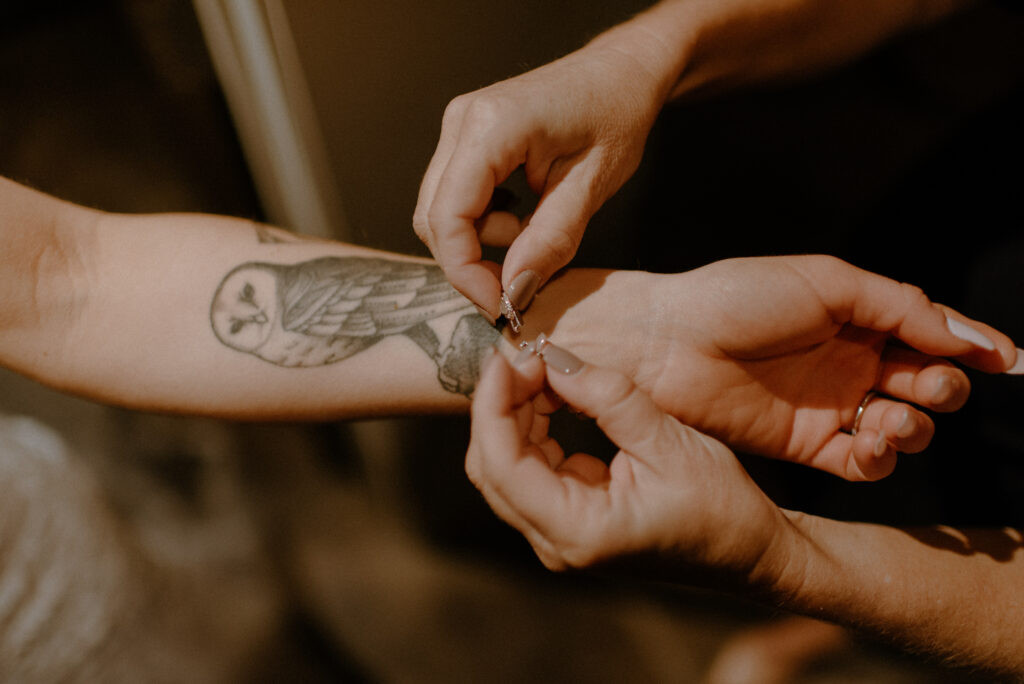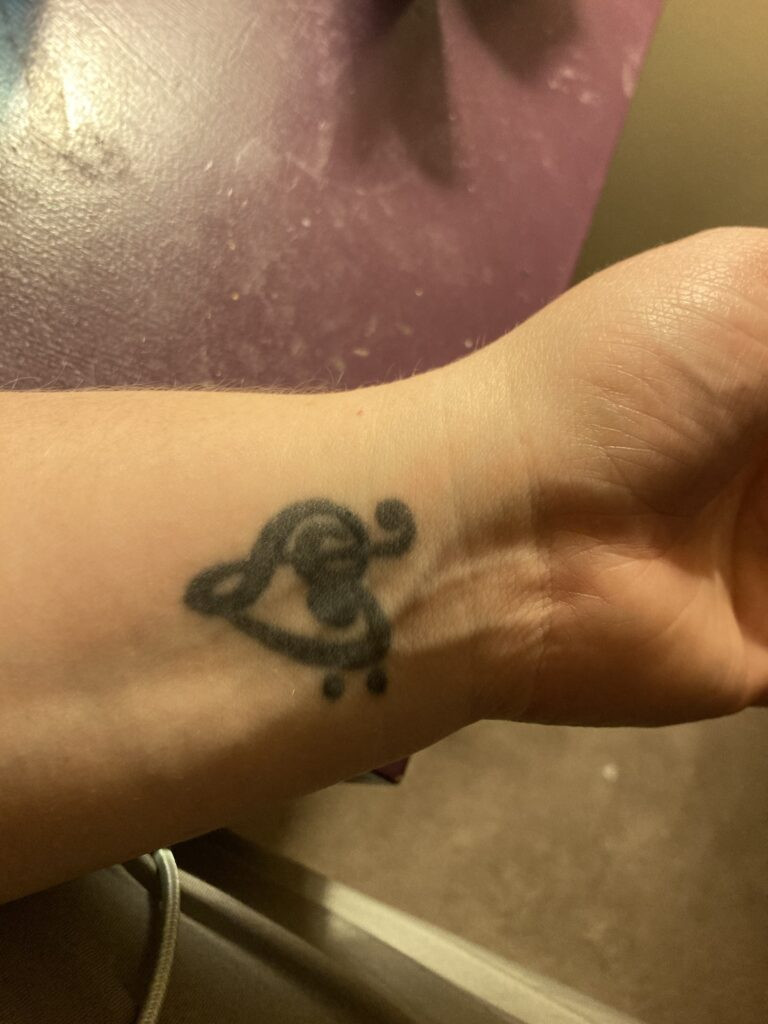Can I Get Tattoos If I Have Eczema? Getting inked is a significant decision, especially when you’re managing eczema; however, it is possible with the right precautions and expert guidance. At tattooat.com, we delve into the world of body art and eczema, offering insights, advice, and considerations to help you make an informed decision about tattoos and eczema-prone skin. Let tattooat.com be your guide as we explore eczema-friendly tattoo options, identifying top-notch tattoo parlors, and delivering professional tattoo aftercare recommendations.
1. Understanding Eczema and Its Impact on Tattooing
Eczema, also known as atopic dermatitis, is a chronic inflammatory skin condition characterized by dry, itchy, and inflamed skin. It affects millions worldwide and can significantly impact one’s daily life. But how does eczema affect your ability to get a tattoo?
1.1. What is Eczema?
Eczema is a condition that causes the skin to become itchy, red, dry, and cracked. According to the American Academy of Dermatology, eczema affects up to 30% of children and 10% of adults. It’s not contagious, but it can be a long-lasting (chronic) condition, and its symptoms can vary in severity.
1.2. How Eczema Affects the Skin
Eczema disrupts the skin’s natural barrier function, making it more susceptible to irritants, allergens, and infections. This can lead to flare-ups, characterized by intense itching, inflammation, and skin lesions.
1.3. The Risks of Tattooing with Eczema
Getting a tattoo involves puncturing the skin with needles and injecting ink, which can pose several risks for individuals with eczema:
- Flare-ups: Tattooing can trigger eczema flare-ups in the tattooed area or even in other parts of the body.
- Infection: Eczema-prone skin is more vulnerable to bacterial, viral, or fungal infections, which can complicate the healing process and lead to scarring.
- Allergic reactions: Tattoo inks contain various chemicals that can cause allergic reactions, such as contact dermatitis, especially in individuals with sensitive skin.
- Scarring: Eczema and tattooing can both increase the risk of scarring, potentially leading to keloid formation or hypertrophic scars.
- Ink rejection: The body’s immune system may reject the tattoo ink, leading to inflammation, itching, and eventual fading of the tattoo.
 Eczema flare-up on skin
Eczema flare-up on skin
Eczema can cause flare-ups on the skin, making it crucial to manage the condition before getting a tattoo.
2. Key Considerations Before Getting a Tattoo with Eczema
Despite the risks, many individuals with eczema successfully get tattoos without complications. However, careful planning and precautions are essential.
2.1. Consulting with a Dermatologist
Before getting a tattoo, it’s crucial to consult with a dermatologist specializing in eczema. They can assess your skin condition, discuss potential risks, and provide personalized recommendations.
2.2. Timing is Everything: Avoiding Flare-Ups
Never get a tattoo during an eczema flare-up. Wait until your skin is calm and well-controlled for several months before considering a tattoo.
2.3. Choosing the Right Tattoo Artist
Select a tattoo artist with experience working with sensitive skin and eczema. Ask to see their portfolio and inquire about their sterilization practices and ink selection.
2.4. Patch Testing Tattoo Inks
Before getting a full tattoo, request a patch test to assess your skin’s reaction to the chosen inks. This involves tattooing a small amount of ink in an inconspicuous area and monitoring for any adverse reactions.
2.5. Location, Location, Location
Choosing the right location for your tattoo is paramount if you have eczema.
Areas Less Prone to Eczema: Opt for areas of the body where eczema is less likely to flare up. These might include the upper arms, back, or calves.
Areas to Avoid: Areas that frequently experience eczema flare-ups, such as the elbows, knees, and neck, should be avoided.
3. Finding the Right Tattoo Artist for Eczema-Prone Skin
Choosing the right tattoo artist is crucial for a safe and successful tattoo experience, especially if you have eczema-prone skin. A knowledgeable and experienced artist can make all the difference in minimizing risks and ensuring proper healing.
3.1. Experience with Eczema and Sensitive Skin
- Look for Artists with a Proven Track Record: Seek out tattoo artists who have experience working with clients who have eczema or other skin sensitivities. They will be more familiar with the unique challenges and precautions necessary.
- Ask for Recommendations: Reach out to online eczema communities or support groups for recommendations on tattoo artists who have a good reputation for working with sensitive skin.
- Review Portfolios: Examine the artist’s portfolio to see examples of their work on different skin types. Look for tattoos that have healed well and show no signs of irritation or complications.
3.2. Consultation and Communication
- Schedule a Consultation: Always schedule a consultation with the tattoo artist before booking your appointment. This will give you an opportunity to discuss your eczema, ask questions, and assess their knowledge and willingness to accommodate your needs.
- Be Open and Honest: Provide the artist with a detailed history of your eczema, including triggers, flare-up patterns, and any allergies or sensitivities you may have. The more information you provide, the better they can tailor the process to your skin.
- Assess Their Understanding: Gauge the artist’s understanding of eczema and their willingness to take necessary precautions. A good artist will be patient, attentive, and eager to work with you to ensure a safe and comfortable experience.
3.3. Hygiene and Sterilization Practices
- Inquire About Sterilization: Ask the artist about their sterilization practices and ensure they follow strict hygiene protocols. All equipment should be properly sterilized and single-use needles should be used.
- Check the Studio Environment: The tattoo studio should be clean, well-maintained, and comply with all local health regulations.
- Look for Certifications: Check if the artist and studio have relevant certifications and licenses, which indicate they have met certain standards of safety and professionalism.
 Tattoo artist working on a client
Tattoo artist working on a client
Choosing a tattoo artist with experience working with eczema or sensitive skin is essential for a safe tattooing process.
3.4. Questions to Ask Your Tattoo Artist
- Experience with Eczema: “Have you worked with clients who have eczema before? What precautions do you take?”
- Ink Selection: “What types of ink do you use? Do you have hypoallergenic options?”
- Sterilization: “How do you sterilize your equipment? Are your needles single-use?”
- Aftercare: “What aftercare routine do you recommend for someone with eczema?”
- Patch Testing: “Do you offer patch tests to check for allergic reactions to the ink?”
- Studio Hygiene: “Can I see your sterilization area and learn more about your hygiene practices?”
4. Choosing the Right Tattoo Ink
Selecting the right tattoo ink is crucial for minimizing the risk of adverse reactions, especially if you have eczema-prone skin. Certain inks are more likely to cause allergies or irritation, so it’s important to do your research and consult with your tattoo artist.
4.1. Hypoallergenic and Sensitive Skin Inks
- Look for Hypoallergenic Inks: Opt for tattoo inks that are specifically formulated for sensitive skin and labeled as hypoallergenic. These inks are less likely to contain common allergens and irritants.
- Consider Vegan Inks: Vegan tattoo inks are often made with fewer chemicals and additives, which can reduce the risk of allergic reactions.
- Research Ink Brands: Investigate different ink brands and read reviews from other people with sensitive skin. Some brands have a better reputation for being gentle and non-irritating.
4.2. Avoiding Common Allergens and Irritants
- Check the Ingredients: Always ask your tattoo artist for a list of ingredients in the inks they use. Avoid inks that contain common allergens such as nickel, chromium, cobalt, and mercury.
- Be Wary of Certain Colors: Red, yellow, and green inks are known to be more likely to cause allergic reactions due to the pigments used. Consider sticking to black or gray inks, which are generally less problematic.
- Avoid Inks with Additives: Some inks contain additives such as preservatives, stabilizers, or fragrances, which can irritate sensitive skin. Choose inks that are as pure and simple as possible.
4.3. Patch Testing
- Importance of Patch Testing: Before getting a full tattoo, always request a patch test to check for allergic reactions to the ink. This involves tattooing a small amount of ink in an inconspicuous area and monitoring for any adverse reactions over a few days.
- How to Perform a Patch Test: Your tattoo artist should be able to perform a patch test for you. If they don’t offer this service, consider finding another artist who does.
- Monitoring for Reactions: Keep an eye out for signs of an allergic reaction, such as redness, itching, swelling, blistering, or rash. If you experience any of these symptoms, consult with a dermatologist immediately.
4.4. Recommended Ink Brands for Sensitive Skin
- Alla Prima Ink: Known for its high-quality pigments and hypoallergenic properties.
- Eternal Ink: Offers a wide range of colors and is a popular choice among tattoo artists for its consistency and vibrancy.
- Intenze Tattoo Ink: Formulated for sensitive skin and free of many common allergens.
- Starbrite Colors: Made with high-purity pigments and known for their long-lasting color.
5. Preparing Your Skin Before Getting a Tattoo
Properly preparing your skin before getting a tattoo is essential for minimizing the risk of complications and ensuring a smooth healing process, especially if you have eczema.
5.1. Hydration and Moisturization
- Hydrate from Within: Drink plenty of water in the days leading up to your tattoo appointment to keep your skin hydrated from the inside out.
- Moisturize Regularly: Apply a gentle, fragrance-free moisturizer to the area you plan to tattoo several times a day. This will help keep your skin supple and less prone to irritation.
- Avoid Harsh Products: Discontinue use of any harsh soaps, exfoliants, or other skincare products that could irritate your skin in the days before your tattoo.
5.2. Avoiding Triggers
- Identify and Avoid Triggers: Be mindful of your eczema triggers and take steps to avoid them in the days leading up to your tattoo appointment. This might include avoiding certain foods, allergens, or stressful situations.
- Stay Cool and Comfortable: Avoid overheating or sweating excessively, as this can exacerbate eczema symptoms. Wear loose, breathable clothing and stay in a cool environment.
5.3. Pre-Appointment Skincare Routine
- Gentle Cleansing: On the day of your appointment, gently cleanse the area you plan to tattoo with a mild, fragrance-free cleanser. Avoid scrubbing or using harsh soaps.
- Avoid Shaving: If possible, avoid shaving the area you plan to tattoo in the days leading up to your appointment. If you must shave, do so gently and with a clean, sharp razor to minimize irritation.
- Skip the Lotion: Do not apply any lotion or moisturizer to the area on the day of your appointment, as this can interfere with the tattoo process.
 Hydrated and moisturized skin
Hydrated and moisturized skin
Keeping your skin hydrated and moisturized is essential before getting a tattoo, especially for people with eczema.
5.4. Medications and Supplements
- Inform Your Artist: Let your tattoo artist know about any medications or supplements you are taking, as some can affect the tattooing process or healing.
- Avoid Blood Thinners: Avoid taking blood-thinning medications such as aspirin or ibuprofen in the days leading up to your appointment, as they can increase bleeding during the tattoo process.
- Consult Your Doctor: If you have any concerns about how your medications or supplements might affect your tattoo, consult with your doctor or dermatologist.
6. Tattoo Aftercare for Eczema-Prone Skin
Proper aftercare is crucial for ensuring your tattoo heals well and doesn’t trigger an eczema flare-up.
6.1. Immediate Aftercare
- Follow Artist’s Instructions: Follow your tattoo artist’s specific aftercare instructions.
- Keep it Clean: Gently wash the tattooed area with mild, fragrance-free soap and warm water. Pat dry with a clean paper towel.
- Moisturize: Apply a thin layer of hypoallergenic, fragrance-free moisturizer to keep the skin hydrated.
6.2. Long-Term Maintenance
- Avoid Irritants: Stay away from harsh soaps, fragrances, and tight clothing that can irritate the skin.
- Sun Protection: Protect your tattoo from the sun by wearing loose clothing or applying sunscreen (once the tattoo is fully healed).
- Stay Hydrated: Drink plenty of water to keep your skin hydrated.
6.3. Products to Use
- Fragrance-Free Soap: Look for gentle, fragrance-free soaps like Cetaphil or Dove Sensitive Skin.
- Hypoallergenic Moisturizers: Use hypoallergenic, fragrance-free moisturizers like Aquaphor or Eucerin.
- Sunscreen: Once healed, use a broad-spectrum, fragrance-free sunscreen with an SPF of 30 or higher.
6.4. Products to Avoid
- Fragrances: Avoid products with added fragrances, as they can irritate sensitive skin.
- Alcohol-Based Products: Steer clear of alcohol-based cleansers or lotions, as they can dry out the skin.
- Harsh Chemicals: Avoid products with harsh chemicals, such as sulfates or parabens.
6.5. What to Watch For
- Signs of Infection: Redness, swelling, pus, or fever.
- Allergic Reactions: Rash, itching, or hives.
- Eczema Flare-Ups: Increased itching, redness, or dryness around the tattoo.
6.6. When to Seek Medical Advice
- Infection: If you suspect an infection, see a doctor immediately.
- Allergic Reaction: Consult a doctor if you experience an allergic reaction.
- Eczema Flare-Up: If your eczema flares up, consult with your dermatologist for treatment options.
 Tattoo aftercare products
Tattoo aftercare products
Proper tattoo aftercare is critical for healing and preventing complications, especially for individuals with eczema.
7. Tattoo Styles and Designs for Eczema-Prone Skin
Choosing the right tattoo style and design can also play a role in minimizing risks and ensuring a successful outcome.
7.1. Simple Designs
- Minimalism: Opt for simple, minimalist designs with clean lines and minimal shading. These designs are less likely to cause irritation and are easier to heal.
- Geometric Patterns: Geometric patterns can be a good choice as they often involve simple lines and shapes that are less likely to irritate the skin.
- Single Needle Tattoos: Single needle tattoos use a single needle to create fine lines and delicate designs. This technique can be gentler on the skin and reduce the risk of irritation.
7.2. Avoiding Complex Shading and Color
- Limit Color: Complex shading and color can increase the risk of allergic reactions and irritation. Consider sticking to black or gray ink, which are generally less problematic.
- Avoid Dense Shading: Dense shading can also irritate the skin and make it harder to heal. Opt for lighter, more sparse shading techniques.
7.3. Placement Considerations
- Choose Low-Friction Areas: Avoid areas of the body that are prone to friction, such as the inner thighs or underarms, as these areas are more likely to experience irritation and delayed healing.
- Consider Areas Less Prone to Eczema: Opt for areas of the body where eczema is less likely to flare up, such as the upper arms, back, or calves.
- Avoid Areas with Scars: Avoid tattooing over areas with scars, as the skin in these areas may be more sensitive and prone to irritation.
7.4. Examples of Suitable Designs
- Fine Line Tattoos: Delicate, minimalist designs created with fine lines.
- Geometric Shapes: Simple, symmetrical patterns that are easy on the skin.
- Script Tattoos: Short quotes or meaningful words in a simple font.
- Small Symbols: Small, discreet symbols that hold personal meaning.
8. Addressing Common Concerns and Myths
There are many misconceptions about getting tattoos with eczema. Let’s debunk some common myths and address frequent concerns.
8.1. Can I Get a Tattoo if I Have Eczema?
Yes, but with precautions. It’s essential to consult with a dermatologist and choose a tattoo artist experienced with sensitive skin.
8.2. Will a Tattoo Cause an Eczema Flare-Up?
It’s possible. Proper preparation, aftercare, and avoiding triggers can minimize this risk.
8.3. Are Certain Tattoo Inks Safer for Eczema?
Yes, hypoallergenic and sensitive skin inks are less likely to cause reactions. Patch testing is crucial.
8.4. Can I Tattoo Over Eczema Scars?
It’s generally not recommended, as scar tissue can be more sensitive and prone to irritation.
8.5. What if My Tattoo Gets Infected?
Seek medical attention immediately. Infections can complicate eczema and require prompt treatment.
9. Real-Life Experiences: Success Stories and Cautions
Hearing from others who have navigated the world of tattoos and eczema can provide valuable insights and encouragement.
9.1. Success Stories
- Alexis Smith: Despite having moderate-to-severe eczema, Alexis has had nine different tattoo sessions over the past seven years. She emphasizes the importance of finding a tattoo artist who understands eczema and using eczema-friendly aftercare products.
- Skyler Winfield: Skyler got her first tattoo a month after her eighteenth birthday to feel more confident in her skin. She emphasizes the importance of choosing a tattoo artist who is experienced in working with different skin tones.
- Zoe McReynolds: Zoe has several tattoos in places where her eczema isn’t too bad and states that it has made a real difference to her self-esteem.
9.2. Cautions and Challenges
- Alyssa Elizabeth: Alyssa experienced an eczema flare-up around her tattoo during the healing process and described the healing process as “the worst part of getting a tattoo.”
- Zoe McReynolds: Zoe admitted that her experience getting a tattoo on her back “was a disaster” because the “the ink didn’t settle” and she needed touch up work after it had healed.
9.3. Tips from People with Eczema
- Research: Research tattoo artists and studios in your area and read reviews from other people with eczema.
- Consult: Schedule a consultation with the tattoo artist to discuss your eczema and ask questions.
- Patch Test: Request a patch test to check for allergic reactions to the ink.
- Aftercare: Follow the aftercare instructions carefully and use eczema-friendly products.
- Patience: Be patient and allow your tattoo to heal properly.
10. The Future of Tattoos and Eczema: Research and Innovations
The field of dermatology and tattoo art is constantly evolving, with new research and innovations offering hope for individuals with eczema.
10.1. Advances in Tattoo Ink Technology
- Hypoallergenic Inks: Researchers are developing new hypoallergenic tattoo inks that are less likely to cause allergic reactions.
- Biodegradable Inks: Biodegradable inks are being developed to reduce the risk of long-term complications and make tattoo removal easier.
- Smart Inks: Smart inks are being developed to change color based on changes in the body’s chemistry, which could be used to monitor health conditions.
10.2. Eczema Treatments and Management
- Biologic Therapies: Biologic therapies are being developed to target specific molecules involved in the inflammatory process of eczema.
- Topical Calcineurin Inhibitors: Topical calcineurin inhibitors are being used to reduce inflammation and itching in eczema without the side effects of corticosteroids.
- JAK Inhibitors: JAK inhibitors are being developed to block the action of enzymes that cause inflammation in eczema.
10.3. Potential for Personalized Tattooing
- Genetic Testing: Genetic testing could be used to identify individuals who are at higher risk of allergic reactions to certain tattoo inks.
- Customized Aftercare: Customized aftercare plans could be developed based on an individual’s skin type and eczema triggers.
- 3D-Printed Tattoos: 3D-printed tattoos could be used to create more precise and less invasive tattoos.
FAQ: Addressing Your Concerns About Tattoos and Eczema
Here are some frequently asked questions about getting tattoos with eczema:
1. Can eczema affect the appearance of a tattoo?
Yes, eczema can cause inflammation and skin changes that may alter the appearance of a tattoo, especially during flare-ups.
2. How long should I wait after an eczema flare-up to get a tattoo?
Wait until your skin is calm and well-controlled for at least a few months before considering a tattoo.
3. Can I use my regular eczema cream on a new tattoo?
Consult with your dermatologist or tattoo artist before using any eczema cream on a new tattoo, as some ingredients may interfere with healing.
4. What are the signs of an allergic reaction to tattoo ink?
Signs of an allergic reaction include redness, itching, swelling, blistering, or rash around the tattoo.
5. Is black tattoo ink safer than colored ink for eczema-prone skin?
Black ink is generally considered safer, as colored inks are more likely to cause allergic reactions.
6. Can I get laser tattoo removal if I have eczema?
Laser tattoo removal may be possible, but it’s essential to consult with a dermatologist, as the procedure can potentially trigger eczema flare-ups.
7. How do I find a tattoo artist experienced with eczema?
Ask for recommendations from online eczema communities or support groups, and check tattoo artist portfolios for experience with sensitive skin.
8. Should I do a patch test for all tattoo inks, even if I’ve had tattoos before?
Yes, it’s always a good idea to do a patch test for all tattoo inks, as your skin’s sensitivity can change over time.
9. What should I do if my tattoo is itchy during the healing process?
Avoid scratching the tattoo, as this can lead to infection or scarring. Apply a hypoallergenic moisturizer and consult with your tattoo artist or dermatologist if the itching persists.
10. Can I swim after getting a tattoo if I have eczema?
Avoid swimming for at least two weeks after getting a tattoo, as exposure to chlorine and other chemicals can irritate the skin and increase the risk of infection.
Conclusion: Making an Informed Decision
Getting a tattoo with eczema requires careful consideration, planning, and precautions. By consulting with a dermatologist, choosing the right tattoo artist, selecting appropriate inks, and following proper aftercare, you can minimize the risks and enjoy beautiful body art. Remember, your skin is unique, and what works for one person may not work for another. Always prioritize your skin’s health and well-being above all else. If you are in the USA, especially Portland, visit tattooat.com to find out more information about the tattoo shops, tattoo artist and tattoo aftercare Address: 1825 SW Broadway, Portland, OR 97201, United States. Phone: +1 (503) 725-3000.
Ready to explore the world of tattoos with eczema? Visit tattooat.com today for inspiration, expert advice, and a curated list of tattoo artists and studios in the USA.
 Tattoo on arm
Tattoo on arm
